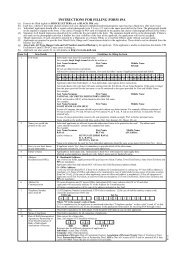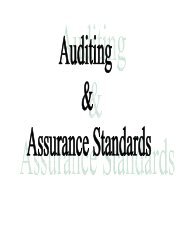Accounting Standards 1-29 - Seth & Associates
Accounting Standards 1-29 - Seth & Associates
Accounting Standards 1-29 - Seth & Associates
Create successful ePaper yourself
Turn your PDF publications into a flip-book with our unique Google optimized e-Paper software.
21. An estimate may have to be revised if changes occur regarding the circumstances on<br />
which the estimate was based, or as a result of new information, more experience or<br />
subsequent developments. The revision of the estimate, by its nature, does not bring the<br />
adjustment within the definitions of an extraordinary item or a prior period item.<br />
22. Sometimes, it is difficult to distinguish between a change in an accounting policy and<br />
a change in an accounting estimate. In such cases, the change is treated as a change in an<br />
accounting estimate, with appropriate disclosure.<br />
23. The effect of a change in an accounting estimate should be included in the<br />
determination of net profit or loss in:<br />
(a) the period of the change, if the change affects the period only; or<br />
(b) the period of the change and future periods, if the change affects both.<br />
24. A change in an accounting estimate may affect the current period only or both the<br />
current period and future periods. For example, a change in the estimate of the amount of<br />
bad debts is recognised immediately and therefore affects only the current period.<br />
However, a change in the estimated useful life of a depreciable asset affects the<br />
depreciation in the current period and in each period during the remaining useful life of<br />
the asset. In both cases, the effect of the change relating to the current period is<br />
recognised as income or expense in the current period. The effect, if any, on future<br />
periods, is recognised in future periods.<br />
25. The effect of a change in an accounting estimate should be classified using the same<br />
classification in the statement of profit and loss as was used previously for the estimate.<br />
26. To ensure the comparability of financial statements of different periods, the effect of<br />
a change in an accounting estimate which was previously included in the profit or loss<br />
from ordinary activities is included in that component of net profit or loss. The effect of a<br />
change in an accounting estimate that was previously included as an extraordinary item is<br />
reported as an extraordinary item.<br />
27. The nature and amount of a change in an accounting estimate which has a material<br />
effect in the current period, or which is expected to have a material effect in subsequent<br />
periods, should be disclosed. If it is impracticable to quantify the amount, this fact should<br />
be disclosed.<br />
Changes in <strong>Accounting</strong> Policies<br />
28. Users need to be able to compare the financial statements of an enterprise over a<br />
period of time in order to identify trends in its financial position, performance and cash<br />
flows. Therefore, the same accounting policies are normally adopted for similar events or<br />
transactions in each period.<br />
<strong>29</strong>. A change in an accounting policy should be made only if the adoption of a different<br />
accounting policy is required by statute or for compliance with an accounting standard or<br />
if it is considered that the change would result in a more appropriate presentation of the<br />
financial statements of the enterprise.<br />
30. A more appropriate presentation of events or transactions in the financial statements<br />
occurs when the new accounting policy results in more relevant or reliable information<br />
about the financial position, performance or cash flows of the enterprise.<br />
31. The following are not changes in accounting policies :<br />
(a) the adoption of an accounting policy for events or transactions that differ in substance<br />
from previously occurring events or transactions, e.g., introduction of a formal retirement




